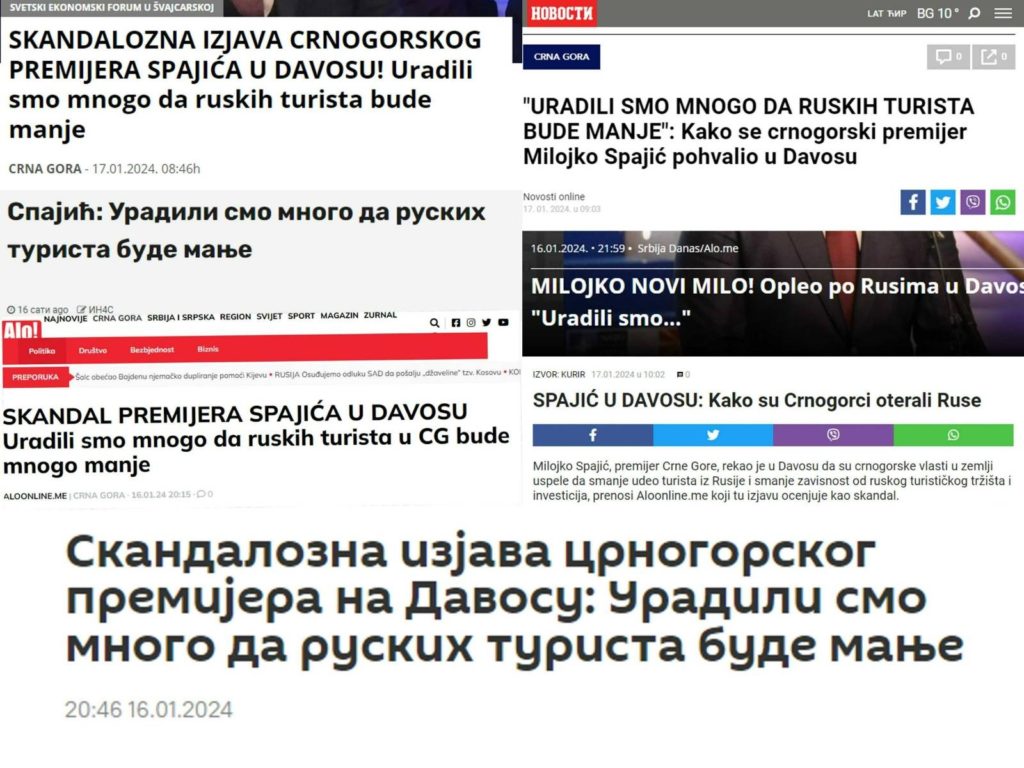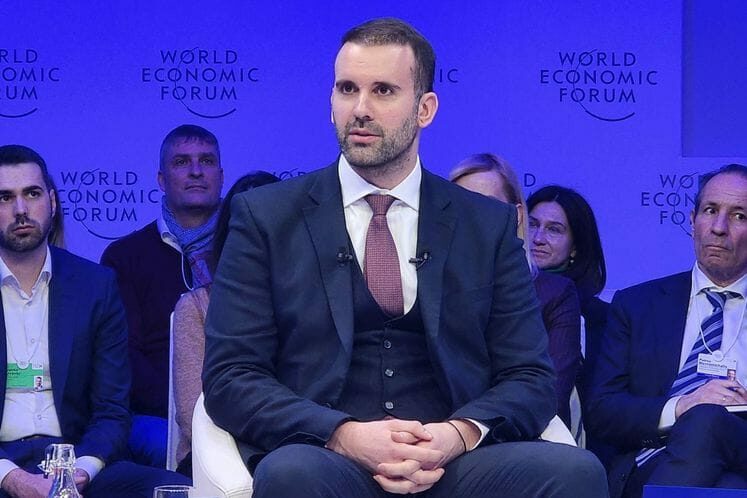Original article (in Montenegrin) was published on 17/01/2024; Author: Darvin Murić
The World Economic Forum in Davos serves as a disinformation magnet. However, these are usually related to geopolitics, “conspiracies against humanity,” and rarely relate to Montenegro. This time, however, Prime Minister Milojko Spajic’s participation in this forum has made him and Montenegro targets of disinformation.
Several online portals from the region reported on the “scandalous” statement made by Spajic at Davos.
“Scandalous statement by the Montenegrin Prime Minister in Davos: We did a lot to have fewer Russian tourists”
“PRIME MINISTER SPAJIC’S SCANDAL IN DAVOS: We did a lot to have fewer Russian tourists”
“SPAJIC IN DAVOS: How Montenegrins drove Russians away “
“MILOJKO IS NEW MILO! Spajic criticizes Russians in Davos: “We did…” were some of the headlines from Sputnik, Alo, Happy, and Srbija Danas.

Content with said claim was shared in the media and on social networks. (1, 2, 3, 4, 5, 6, 7, 8, 9, 10)
“The Prime Minister of Montenegro, Milojko Spajic, said in Davos that the Montenegrin authorities managed to reduce the share of tourists from Russia and decrease dependence on the Russian tourist market and investments, as reported by Aloonline.me.
‘When I became Minister of Finance in 2020, we inherited a country whose infrastructure was entirely built by companies funded from outside the EU. As a tourist destination, we receive millions of tourists every year, and most of them come from Russia. Investors were almost exclusively from outside the EU,’ Spajic said,” according to the article published by the Montenegrin branch of the Alo tabloid, and shared by Sputnik, IN4S, and others.
Spajic is currently participating in a forum that has brought together numerous global and regional leaders, speaking on one of the panels related to the economy and the EU. The recording of the entire panel can be found on YouTube.
So, what did Spajic say and what question was he answering?
The panel moderator asked Spajic the following question:
“Most of the Western Balkan countries have been somehow stuck in this process and waiting room for an entire generation – this is a very long period. Russia’s invasion of Ukraine has given new momentum to the EU accession process, and Montenegro is specifically seen as one of the best-performing candidate countries in the neighborhood. What economic arguments do you use to make your case in Brussels for a speedier accession process?”
The Prime Minister then explained how he found it surprising that Montenegro and other Western Balkan countries lacked economic connectivity with the EU.
“As someone who comes from the private sector myself, it was pretty puzzling to see a situation in which Montenegro and some other Western Balkan countries lack economic connection with the EU. When I became a technocratic Minister of Finance in 2020, we inherited a country whose infrastructure was entirely built by companies and financiers from outside the EU. As a destination that receives millions of tourists yearly, most tourists come from Russia. And investors were almost exclusively from outside the EU. And we are geographically very close to the geographic center of Europe, we use the euro as a currency, etc. It’s very strange, since we are surrounded by the European Union, it’s strange to have such a country. We did a lot to change that. Now the number of Russian tourists is 7-8 percent, so it’s way less… dependence on the Russian market for tourism has become more replaceable than it used to be before. Dependence has decreased massively. For infrastructure, we have finally signed a large investment agreement with the EIB for our railways. This is the first time we have received such a large investment from Europe,” Spajic said.
So, the Prime Minister did not speak about “driving Russians away ” or about doing a lot to have fewer Russian tourists. Instead, he talked about reducing dependence on non-EU markets and turning towards the European market.
Montenegro signed the Stabilization and Association Agreement with the EU in 2007 as an international treaty between the signatory state and the European Union (EU), establishing a legal framework for cooperation and gradual alignment with European standards. The agreement regulates the obligations of the future candidate country for EU membership, primarily regarding the adoption and implementation of certain laws and the fulfillment of specific standards in the quality of state administration and institutional capacity. In return, the European Union significantly facilitates access to its market for companies from the signatory country, providing technical and financial support from the Union’s accession funds. Therefore, in 2007, Montenegro committed to harmonizing its laws with EU laws, making the EU, which it aspires to join, its key political and economic partner.
The quote from the response to the same question, which media and individuals on social media “overlooked” or omitted, confirms that Spajic was not talking about “driving Russians away ” or “doing a lot to have fewer Russian tourists” but about reducing dependence on markets and economies outside the EU, of which Montenegro wants to be a part:
“Montenegro used to be more like Mongolia or Kazakhstan in terms of economic structure but geopolitically and strategically oriented towards Brussels. Such a discrepancy does not work in the long run. If you want to be part of the club, you have to be part of it economically and value-wise.”
The EU and its member states often criticize and express concern about investments coming from outside the EU that are not transparent, as was the case with Montenegro’s economic citizenship program, the European Commission sought Montenegro to abolish due to the risk of corruption and money laundering.
Montenegro has long had an issue with capital coming from authoritarian and hybrid regimes in the form of direct foreign investments. This is precisely what Spajic was referring to when he said that one must be oriented towards the EU both economically and value-wise.
Therefore, the Prime Minister did not speak about “driving Russians away ” or reducing the number of Russian tourists. Instead, he discussed the shift of the economy and market towards the European Union, indicating a reduced dependence on markets outside the EU, of which Montenegro is striving to become a member.
Since Spajic’s statement was taken out of context, the online portals and social media publications are assessed as manipulation of facts. The “Manipulation of facts” rating is given to a media report that uses well-known and accurate facts but deceptively interprets them. These reports generally use accurate information to draw incorrect conclusions or claims, thus steering the conclusions of consumers of media content in the wrong direction in relation to the actual meaning of the facts presented.
Additionally, these posts are assessed as disinformation. The “Disinformation” rating is given to a media report that contains a “mix” of facts and incorrect or half-true content. In such cases, the media may not necessarily be aware of incorrect information being published alongside the true ones. Also, this grade will be given to media reports with false attributions or titles that do not reflect the text in terms of information accuracy.



